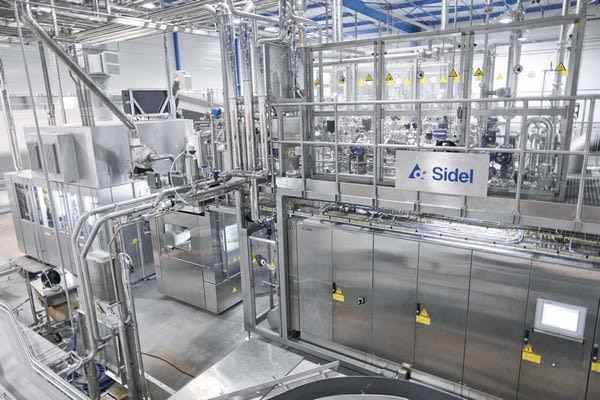 Beverage producers are currently facing multiple challenges. Their packaging solutions need to be innovative and able to offer great consumer experiences. Also, they have to ensure product integrity to meet food safety standards. All of this, without compromising on cost effectiveness. Sidel has worked with liquid dairy products (LDP) and juices, nectars, soft drinks, isotonics and teas (JNSDIT) producers for over 50 years - developing extensive experience and expertise in aseptic packaging. This means that the company can offer all the proven benefits of reliable PET aseptic complete line solutions.
Beverage producers are currently facing multiple challenges. Their packaging solutions need to be innovative and able to offer great consumer experiences. Also, they have to ensure product integrity to meet food safety standards. All of this, without compromising on cost effectiveness. Sidel has worked with liquid dairy products (LDP) and juices, nectars, soft drinks, isotonics and teas (JNSDIT) producers for over 50 years - developing extensive experience and expertise in aseptic packaging. This means that the company can offer all the proven benefits of reliable PET aseptic complete line solutions.The increasing consumption rates of JNSDIT and LDP products - growing respectively by 6% and 5% on a yearly basis - provides significant business development opportunities for producers. The use of PET in these market segments continues to increase, with an annual growth of 3% expected for the JNSDIT sector and 8% for LDP by 2020. Producers can enlarge their bottling capacity or diversify their production with more value-added products in PET to maximise this market potential.
Whatever the industry business goals, one concern stands above all others: food safety. PET bottles offer great physical protection and food barrier benefits that maintain the product's safety and integrity across the supply chain. Guillaume Rolland, Sensitive Products Category Director at Sidel, comments - "Worldwide, consumers are becoming increasingly health-conscious and moving towards drinks with a more natural taste. This has brought a focus from producers on filling methods that protect the quality, taste and vitamin content of the beverages. Hot fill and aseptic filling solutions maintain the properties of beverages." Using PET in aseptic packaging solutions offers great business opportunities through bottling sensitive products to be distributed at ambient temperature, preserving organoleptic properties and keeping them free from bacteria. It gives products a shelf life without pasteurisation, hot filling or the use of preservatives or sterilising agents.
By choosing a PET aseptic complete line solution from Sidel, beverage producers can protect sensitive drinks and differentiate brands, handling a broad variety of products while reducing environmental impact and costs.
Optimised aseptic production
By partnering with Sidel, producers work with a single, market-leading supplier and can leverage an extensive 40 years of aseptic packaging expertise. Meeting producers' needs via fully connected aseptic lines requires an approach that is both holistic and flexible. The company's fully integrated and technically advanced solutions employ the processing equipment and capabilities of Tetra Pak Processing Systems (TPPS) - the original inventor of aseptic technology. Over the years, Sidel and TPPS have been combining competencies and expertise to define and execute almost 100 complete lines projects.Sidel's extensive experience, innovative equipment and professional services, assist customers through the entire production process. This ranges from differentiating and customised bottle and complete line design to fast production ramp-up and beyond. Tackling the challenges of sensitive beverages while maintaining cost-efficiency, the company helps producers package their products with the correct PET solution. It ensures food safety, product integrity and longevity while providing the support to build and differentiate their brand.
Beverage and packaging solutions qualified by in-house experts
Sensitive drinks can be affected by various factors when they are packaged - micro-organisms, light, oxygen and temperature. As well as ensuring that these do not detract from the quality of the content, PET also presents real opportunities to enhance the finished product. If Sidel's scientific expertise on beverage packaging and industrial production is involved early in a new product packaging project, producers will be able to optimise bottle performance while ensuring product safety and quality. They will also achieve faster time to market and bottle designs which stand out on the supermarket shelves.Sidel experts in chemistry, microbiology, food science, filling processes and packaging materials help customers to qualify specific packaging solutions. This can involve a number of processes, including evaluating bottle samples and performing physical, chemical and sensory analyses to determine how the liquid interacts with the package. Tests are carried out under supply chain conditions to determine the optimal solution for defined distribution methods and shelf life.
Based on the results, Sidel experts then make recommendations on bottle barrier material, weight, shape and type of cap, in order to ensure the product's desired shelf life.




